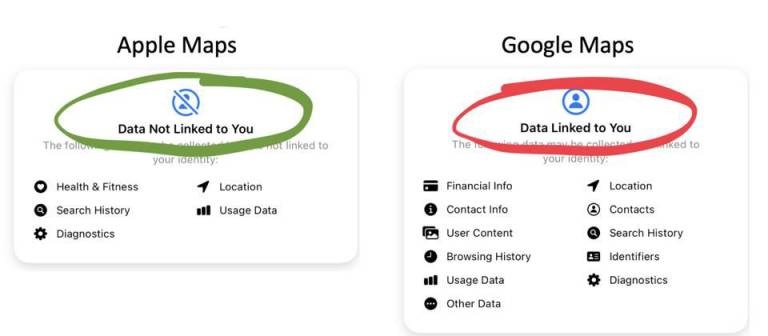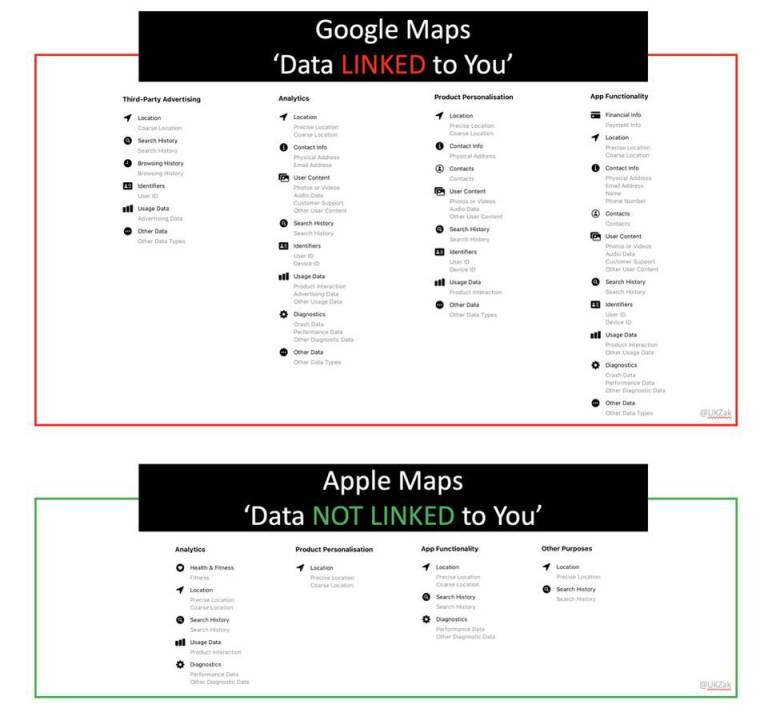Google didn’t surprise anyone when it stopped updating its mobile apps on iOS in late 2020. Apple had just rolled the new app privacy labels that show users the terrifying amount of data apps collect from them. Facebook was the most vociferous critic of Apple, but the company did choose to immediately show users just how much data it grabs from iPhone and iPad, even as it attacked Apple. Google, meanwhile, was silent on the matter but stopped updating its apps.
Complying with Apple’s privacy rules isn’t optional. Google ultimately had to update its iOS apps to show just how much data it gathers from users. We addressed some of them in the past and even told you that you might want to delete certain Google apps from iPhone, iPad, and Mac if you value your privacy. Google Maps fits right into that category, and of all the Google apps that track you, it might be the most difficult to cut out of your life. But if you value your privacy, you might want to replace Google Maps with Apple Maps in the future.
Google Maps is the best example of what your data can purchase — and why handing over personal information to Google makes more sense than sharing data with Facebook. Google Maps is a must-have navigation app on your mobile device, and Google keeps upgrading the experience. The app isn’t just for helping you find directions and making your commute more comfortable with more intelligent features. It’s also about helping you explore your surroundings and discover new things or find the things you need when you’re out and about.
But Google Maps can only be free of charge on iPhone, Android, and the web because you pay for it with fresh batches of personal data. Google doesn’t harness just the location you allow Google Maps to access when using the app, but all sorts of other information that is then used to enrich our profile and determine what sort of personalized ads you’re more likely to interact with. Click on those lucrative ads, and Google earns its commission. That money is then used to improve products like Maps and reach profit targets.
This goes on under the hood without you explicitly realizing it. Even if you do, you probably understand and appreciate the trade-off and put up with it for the service the app provides. This doesn’t change the fact that Google Maps collects a terrifying amount of user data. Forbes addressed Google Maps and its access to user data on iPhone and produced the following images with the help of Apple’s app privacy labels.
The first shows a clear difference between Apple Maps and Google Maps. Location data is linked to you on Google Maps, whereas Apple doesn’t link location data to your profile:

It turns out that Google Maps hoards a lot more data about the user, as seen in the following image. And Apple Maps doesn’t link any of the data it collects to you:

All those data points are going to contribute to Google’s profile of you. It’s how Google Maps and all of Google’s apps have always worked. It’s only thanks to the new privacy labels in iOS 14 that we know just how much information is being collected.
Forbes does point out that there is a way to use Google Maps and not share as much data with Google, but the overall experience will have to suffer. You’ll have to go incognito, at which point a bunch of great Maps features will have limited functionality if any. Again, what makes Google Maps so great is the time and effort that Google puts into it. And personal data pays for all of that.
iPhone users who have no objections about this particular privacy transaction should not care about how much data Google collects about them. But those who value their privacy and want to get rid of Google apps might discover that removing Google Maps from iPhone might be the most challenging thing they had to do.
The Google Maps privacy labels are available at this link, while the Apple Maps privacy labels can be found here. The full Forbes article is available here.








